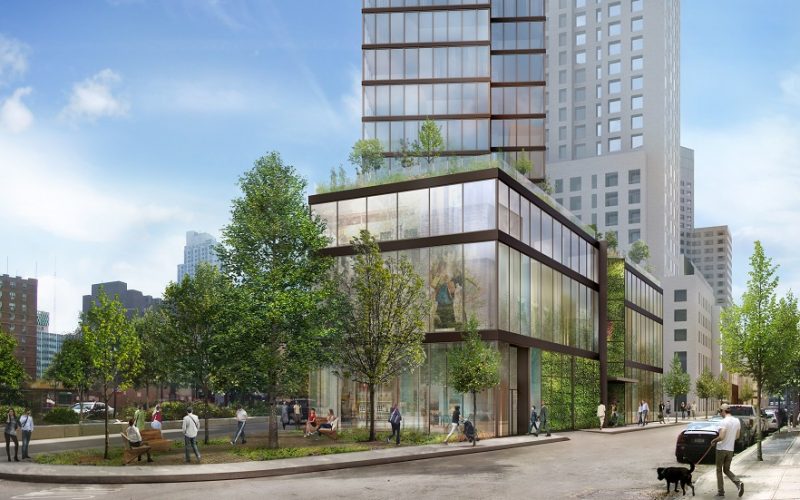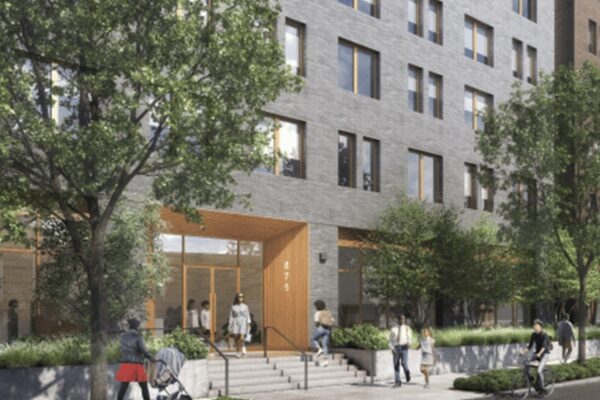NEW YORK—Mayor Bill de Blasio, City Council Speaker Melissa Mark-Viverito and elected officials today celebrate the one year anniversary of the passage of Mandatory Inclusionary Housing (MIH), a program that requires developers to build permanently affordable housing in areas zoned for growth to ensure that all of the city’s neighborhoods will be diverse and inclusive. In the first year alone, 11 applications for nearly 4,700 new affordable homes have been approved by the City Council. At least 1,600 are required to be permanently affordable under MIH.
This landmark MIH legislation, the strongest inclusionary program in the nation, was adopted by the City Council on March 22, 2016. It was the result of months of advocacy by the Mayor, his administration, and the New York City Council working to create a program that protects our neighborhoods by mandating affordability.
Compared to MIH programs in other cities, New York City’s requires a higher percentage of affordable housing, serves lower income families and a broader range of households, and will result in more affordable housing being located in the same building as market rate housing. MIH ensures balanced growth and economically diverse neighborhoods, while also providing a tool for communities to shape development.
The Council also adopted Zoning for Quality & Affordability, a far-reaching overhaul of the City’s zoning resolution that encourages the construction of affordable housing across the city, especially for seniors, by lowering costs and adding flexibility. ZQA also allows for better-ground floor retail and community-facility spaces. MIH and ZQA works with other housing programs to achieve ambitious affordability targets set in Housing New York.
“Among our most important achievements as we strive to secure affordability for millions of New Yorkers was passing these historic zoning changes, Mandatory Inclusionary Housing and Zoning for Quality & Affordability. With them, we will build tens of thousands of affordable homes for seniors, veterans and working families,” said Mayor Bill de Blasio.
“After hearing the concerns from communities across New York City and after months of deliberations last year the City Council adopted with significant changes two far reaching proposals to better align our housing policy with the real housing needs of New Yorkers. Since then the Council has voted on a number of projects which will produce thousands of affordable units for New Yorkers with many more affordable apartments on the way. I want to thank again Chair Greenfield and Chair Richards for their extraordinary efforts shepherding these proposals through the City Council and the Mayor, DCP, HPD for having the courage to take these issues head on,” Council Speaker Melissa Mark-Viverito said.
“Last year, the New York City Council and Planning Commission marked the centennial of our Zoning Resolution with what will long be viewed as among the most historic changes to urban land use and housing policy. Mandatory Inclusionary Housing uses zoning to give New Yorkers of all walks of life a future in this city. I am immensely proud to have been a key part of passing this law that creates so much affordable housing. I am also proud that the complementary Zoning for Quality and Affordability make it easier to construct affordable homes. I look forward to working with my colleagues and our diverse constituencies to see this historic legislation take root and flourish in neighborhoods across the city,” said Council Member David G. Greenfield, Chair of the Land Use Committee.
“During the last year since MIH and ZQA were implemented, the City Council and Mayor de Blasio’s administration have delivered thousands of units of affordable housing that would not have been part of the discussion previously,” Council Member Donovan Richards, Chair of the Subcommittee on Zoning and Franchises, said. “I’m proud to be a part of the process that helped get us this far, but we have a lot more work to do and I look forward to ensuring that we maximize every opportunity to find housing for New Yorkers who need it the most.”
“MIH and ZQA are powerful affordability tools to help make New York work for everyone. While it has been just one year, they are already bearing fruit. We must continue to use MIH and ZQA to facilitate affordable housing as we plan for growth in targeted locations throughout our city. These zoning regulations, together with the formidable tools of our partners at HPD and HDC, position us to work effectively with communities and their elected representatives to achieve the affordability goals of Housing New York: providing opportunity to New Yorkers with a range of incomes and strengthening our neighborhoods,” said City Planning Commission Chair Marisa Lago.
“MIH and ZQA changed the paradigm for how New York City will grow for generations to come,” said Housing Preservation and Development Commissioner Maria Torres-Springer. “Thanks to this landmark victory, the city now has a robust MIH pipeline of permanently affordable housing to ensure inclusive growth in our neighborhoods. By overhauling the zoning code, ZQA is already resulting in buildings with better design and more affordable housing, especially for our seniors. HPD is grateful to Mayor de Blasio and the entire City Council for their leadership, and to our partners at City Planning for this monumental achievement to keep our neighborhoods affordable and diverse and our city strong.”
“The passage of MIH and ZQA have provided critical new tools to address our City’s affordable housing crisis,” said Eric Enderlin, President of the City’s Housing Development Corporation. “By ensuring the development of affordable housing is not just mandatory, but permanently affordable, MIH enables us to provide long term housing solutions for more New Yorkers at a wide range of incomes. This visionary legislation demonstrates the City’s commitment to ensuring New York City truly remains a city for everyone.”
Approved Projects:
QUEENS: One Flushing (231 Total Units / 83 Permanently Affordable Units)
BRONX:
La Central (1,655 Total Affordable Units / 331-413 Permanently Affordable Units)
Concourse Village West (265 Total Affordable Units / 68 Permanently Affordable Units)
1932 Bryant Ave (327 Total Units / 82-98 Permanently Affordable Units)
147th St Rezoning (165 Total Affordable Units / 58-81 Permanently Affordable Units)
MANHATTAN:
Lexington Gardens II (400 Total Affordable Units / 160 Permanently Affordable Units)
The Robeson (79 Total Affordable Units / 22 Permanently Affordable Units)
The Frederick (74 Total Affordable Units / 19 Permanently Affordable Units)
550 Washington St (1,586 Total Units / 476 Permanently Affordable Units)
BROOKLYN: 141 Willoughby St (202 Total Units / 60 Permanently Affordable Units)
“The Mandatory Inclusionary Housing program is undoubtedly one of Mayor de Blasio’s most important achievements, and it will help greatly expand access to affordable housing units in the Bronx. On behalf of the Bronx, I thank and applaud Mayor de Blasio and the City Council for this important and ambitious effort to tackle what is perhaps the most pressing issue for NYC working families,” said Congressman José E. Serrano.
“The Mandatory Inclusionary Housing program has been an essential resource in our ability to provide and maintain affordable housing for thousands of New York residents,” said Congressman Adriano Espaillat. “The MIH program has proven successful in our efforts to create more economically diverse communities across New York City and to ensure that a share of new housing in growing communities is affordable and accessible to all residents.”
“MIH and ZQA are among the strongest mandates for affordable housing in the United States,” said Council Member Rafael Espinal. “As the first and only Council Member to secure a comprehensive rezoning plan under Mayor de Blasio’s administration, I am proud that we had these tools at our disposal to ensure permanent affordable housing for our community.”
“It took decades for New York City to require affordable units in new developments, and it was a win that will pay off for decades to come. Thanks to MIH, we can think about planning for neighborhoods like Gowanus in a way that will make them inclusive and affordable to a wide range of New Yorkers,” said Council Member Brad Lander.
“One year later, I am prouder than ever of our City’s collective effort to institute these zoning changes for the creation of affordable housing that New Yorkers desperately need,” said Council Member Margaret S. Chin. “The passage of MIH and ZQA is proof of the power of principled action to address one of the greatest challenges of our time. I thank our Mayor, my Council colleagues and community members for working together to create a program to preserve our neighborhoods and to increase affordability for current and future generations.”
Council Member Helen Rosenthal said, “Mandatory Inclusionary Housing and Zoning for Quality and Affordability represent a critical step toward addressing New York’s affordable housing crisis. That these programs have already begun to deliver results is greatly encouraging and is just the beginning. Thousands more New Yorkers will find an affordable home as a result of these programs going forward, and I’m so proud that Mayor de Blasio, the City Council, and housing advocates across New York City were able to come together to make it happen.”
“The passing of the Zoning for Quality and Affordability text amendment was a remarkable feat of policy-making to develop affordable housing. It was a difficult and complex approach but the City remained committed and it has proved to be hugely effective. At a time when new housing is urgently needed, ZQA removed unnecessary regulatory barriers and it has allowed for more affordable housing to be built,” said Sarah Watson, Deputy Director CHPC.
Bobbie Sackman, Associate Executive Director of Public Policy, LiveOn NY, said, “LiveOn NY greatly appreciates the accomplishments that the passage of ZQA, working closely with Mayor de Blasio and City Council, brought to fostering more affordable housing for seniors. One year ago we reported that over 200,000 older New Yorkers are on waiting lists for affordable housing throughout the city. This poignantly portrays the depth of the affordable housing crisis for seniors. While we cannot build our way out of this housing crisis, we do believe that modernizing the zoning laws has made a difference in communities across the city to build affordable senior housing.”
“MIH and ZQA are playing a transformative role in producing much-needed affordable housing for low- and middle-income families across our city,” said Jolie Milstein, president and CEO of the New York State Association for Affordable Housing (NYSAFAH). “Along with leading the nation’s most ambitious MIH program, Mayor de Blasio has demonstrated his tireless commitment to affordable housing by working with all community and industry stakeholders to get the job done.”






















Leave a Reply